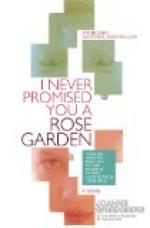“Having done this, she seemed to forget us and drifted away among the flowers, touching some gently as she passed, snipping a dead leaf here and arranging a misplaced branch there.
“We left almost immediately, but have been there many times since, and though as a whole the garden is too heavily fragrant, I thought that it might suggest possibilities to you.”
As Aunt Lavinia paused we were turning from the main road into the narrow but beautifully kept lane upon which the Herb Farm, as it was still called, was located, by one of those strange freaks that sometimes induces people to build in a strangely inaccessible spot, though quite near civilization. I know that you must have come upon many such places in your wanderings.
Of course my curiosity was piqued, and I felt, besides, as if I was about to step into the page of some strange psychological romance, nor was I disappointed.
The first thing that I saw when we entered was a great strip of heliotrope that rivalled my own, and opposite it an equal mass of silvery lavender crowned by its own flowers, of the colour that we so frequently use as a term, but seldom correctly. There were no flagged or gravel walks, but closely shorn grass paths, the width of a lawn-mower, that followed the outline of the borders and made grateful footing.
Bounding the heliotrope and lavender on one side was a large bed of what I at first thought were Margaret carnations, of every colour combination known to the flower, but a closer view showed that while those in the centre were Margarets, those of the wide border were of a heavier quality both in build of plant, texture of leaf, and flower, which was like a compact greenhouse carnation, the edges of the petals being very smooth and round, while in addition to many rich, solid colours there were flowers of white-and-yellow ground, edged and striped and flaked with colour, and the fragrance delicious and reminiscent of the clove pinks of May.
Mrs. Puffin, the companion, could tell us little about them except that the seed from which they were raised came from England and that, as she put it, they were fussy, troublesome things, as those sown one season had to be lifted and wintered in the cold pit and get just so much air every day, and be planted out in the border again in April. Aunt Lavinia recognized them as the same border carnations over which she had raved when she first saw them in the trim gardens of Hampton Court. Can either you or Evan tell me more of them and why we do not see them here? Before long I shall go garden mad, I fear; for after grooming the place into a generally decorative and floriferous condition of trees, shrubs, vines, ferns, etc., will come the hunger for specialties that if completely satisfied will necessitate not only a rosary, a lily and wild garden, a garden—rather than simply a bed—of sweet odours, and lastly a garden wholly for the family of pinks or carnations, whichever is the senior title. I never thought of these last except as a garden incident until I saw their possibilities in Mrs. Marchant’s space of fragrant leaves and flowers.




